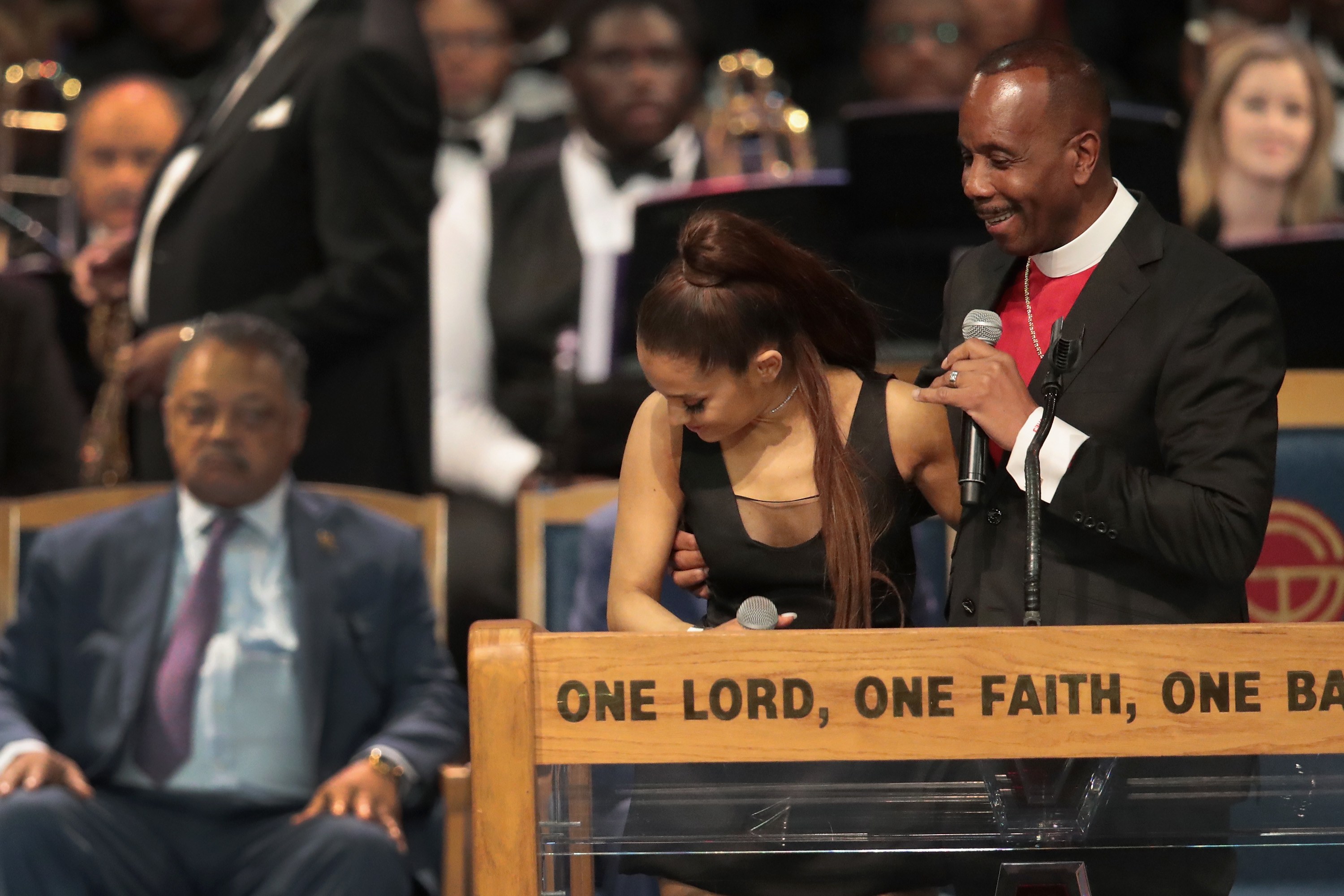Growing Up in the Church, I Know the Ariana Grande Groping Moment Well

The moment was the antithesis of one of Aretha Franklin’s most popular hits. As the world stopped to celebrate the homegoing of The Queen of Soul on Friday—the traditional black church gathering to celebrate Franklin’s transition from earthside to the Lord—the dark cloud of patriarchy and misogyny threatened to overshadow the service when a bishop failed to R-E-S-P-E-C-T pop star Ariana Grande, inappropriately touching her breast area for the world to see.
As part of the celebration, Grande sang Franklin’s hit, “(You Make Me Feel Like) A Natural Woman.” At the conclusion of her performance, Bishop Charles H. Ellis III called Grande to the pulpit, wrapped his arms around her (his fingers touching her breast) and made the racist remark that he’d thought “Ariana Grande” was a meal at Taco Bell. Some laughed and many cringed. But it was Bishop Ellis’ inappropriate touch that triggered most women, especially those who grew up in the church. It was a moment that, even a decade after Tarana Burke created #MeToo and its meteoric digital rise last year following the Harvey Weinstein accusations, proves that it is past time to publicly reckon with the mistreatment of girls and women in holy spaces.
Many church girls like me knew that moment. We’ve experienced it from pastors, deacons and older men who, under the guise of complimenting, have inappropriately commented on how nice we looked on Sundays. Later, how well we were growing into womanhood. Our girlhood, in church and on the street, cut short under the surveilling eyes of men. We made the same face as Grande (the embarrassed drop of the head, that uncomfortable chuckle) as we tried to maneuver out of unwelcomed embraces that lasted too long and lingering touches we never requested. And the shame was on us to carry. This behavior—almost always accepted or dismissed, even enabled—that made us coil our changing bodies inward, feeling the stinging humiliation of being fondled, the betrayal that our bodies were budding breasts and curves for the consumption of men.
Following Bishop Ellis’ apology and in response to those who came to his defense, many remembered when their complaints were dismissed with “that’s just how he is” and “he is just being friendly.” Others remembered why they never told anyone.
For many women, this is why they have turned away from the church. It’s the deeply embedded culture that allows for the violation of girls and women, that refusal to hear us when we say what we don’t want, and, in Grande’s case, the way we boomerang the blame back to the victim. (This was evident in the scrutiny of Grande’s black dress, which eventually evoked the rape culture rhetoric that it was what she wore to the funeral that resulted in her assault). This isn’t unique to the church—this violent culture of toxic masculinity that wrongly holds women accountable—but there’s something deeply troubling about the sexual violation of girls and women in sacred spaces. Especially when that environment is intended to be a balm to society’s ills.
https://twitter.com/AmberJPhillips/status/1035718129568104448
The work of the #MeToo movement and other women’s movements has brought attention to the ways men abuse power in every sphere of society—and the church’s refusal to take seriously the issue of sexual misconduct is rooted in society’s investment in the power of men. For as beautiful as Franklin’s homegoing was, it represented every aspect of that reality. Heavily dominated by the presence of men, we were reminded that women are often only given room to sing and lift our spirits but rarely the space to preach and save our souls. As a preacher’s kid, teen mom, and one who pursued a secular career as opposed to gospel, Aretha Franklin often felt the sting of the church. And in the final celebration of her life, she felt it again.
Franklin, along with Grande and the women who have lived that moment before, deserved so much more from an institution many of us love and still believe in. And it has become clear that these conversations about the experiences of girls and women can no longer just be held in the privacy of our homes. It’s time to address this misconduct on a global scale.
We have no choice: If sexism and patriarchy could not take the day off to honor Aretha Franklin in the house of God, it will never stop its assault against us.
Candice Benbow is a writer and the creator of The Lemonade Syllabus, whose work focuses on faith, feminism and pop culture.
MORE: The Bishop Who Groped Ariana Grande at Aretha Franklin’s Funeral Has Apologized





